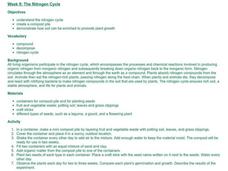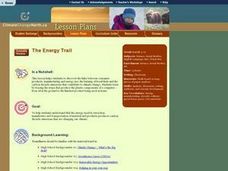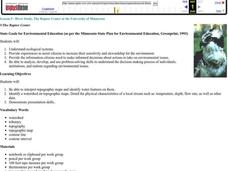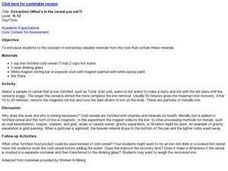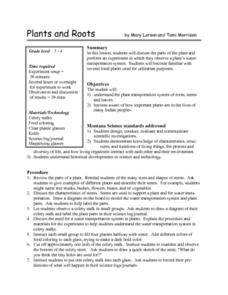Curated OER
Water: Liquid or Solid?
First graders investigate how water can be both a liquid and a solid. They weigh popsicles and observe them as they write in their science journals. They measure the liquid as the popsicle melts and refreeze them to change them back...
Curated OER
The Nitrogen Cycle
Young scholars design and create a compost pile in order to study the Nitrogen Cycle. They then use the scientific method to determine if plants grow better when they add organic matter from their compost pile to the plant's soil.
Curated OER
The Energy Trail
Young scholars examine the relationship between the products they use and energy use. Using the internet, they identify the role that manufacturing plays in using energy and the emissions that change the climate. They discover the...
Curated OER
American Chestnut
Learners discuss importance of American Chestnut tree, explore its value and uses, examine how it has almost become extinct, and identify ways certain groups are working to help regain American Chestnut tree population through breeding.
Curated OER
Earth Science: The Structure of the Earth
Learners identify and complete activities about the structure of the Earth. In this Earth structure lesson, students view a Powerpoint about the Earth's layers and complete a diagram. learners compare temperatures in the Earth's layers...
Curated OER
River Study
Students explore a stream in their area and show the class the topographic map of the stream. They locate the topographic map and name the streams, lakes and ponds in their watershed. They write a paragraph about their stream and...
Curated OER
Bottled Model Lungs
Students will learn about the respiratory system by comparing and contrasting models, building their own models, and giving one another feedback. Questions about familiar body systems can be useful in getting students to start thinking...
Curated OER
Heredity (Mendelian Genetics)
Young scholars observe and record observations of whether a person is a taster or nontaster. They test selected individuals from their families and peer groups and chart all findings to determine which trait (e.g. taster or non-taster)...
Curated OER
California Biodiversity
High schoolers examine several maps of California exhibiting features such as precipitation, topography, and vegetation. They look for patterns that might be the source of or influence biodiversity in different regions. They pay...
Curated OER
The Nitrogen Cycle
Fifth graders investigate the nitrogen cycle and examine the concepts of decomposition and nitrification. Students participate in a class discussion about the creation of waste and ammonia compounds, then using nitrogen cycle cut-outs...
Curated OER
Plant Life Cycle
Fourth graders explore the plant life cycle. They discuss the sequence of events in the life cycle of the plant and illustrate how the life cycle never ends. Students explore the importance of water, sunlight, and nutrients during the...
Curated OER
Solid, Liquid, Gas!
Pupils determine the properties of the solids, liquids, and gases, and how they can recognize those properties by observing a teacher demonstration. Next, they experiment with at mystery matter that looks like a liquid but that takes on...
Curated OER
Extraction (What's in the cereal you eat?)
Students conduct an investigation with cereal that simulates the extraction of minerals from rock. They mix iron fortified cereal until the iron is extracted and shows on a magnetic stick that is painted white.
Curated OER
Diversity And Adaptations Of Organisms
Eighth graders study how and why animals are classified into eight groups in the animal kingdom. They work together to identify organisms. They use the key to determine the phylum for the included problems.
Curated OER
The Bulbs: Camas and Daffodil
Fourth graders become aware of the importance of the camas bulb to the Nez Perce people, they learn the parts of plants, and gain understanding of the interdependence of Nature. They study about the possible causes and outcomes of global...
Curated OER
Plants and Roots
Pupils discuss the parts of the plant and
perform an experiment in which they observe a plant's water
transportation system. They become familiar with
several local plants used for utilitarian purposes.
Curated OER
Classifying Living and Non-Living Objects
Students investigate living organisms and define the properties of a living species. In this life characteristic lesson plan, students examine plants in their class and discuss whether or not they are alive. Students create a living...
Curated OER
Driving Currents
Students conduct a variety of investigations to see how water, heat, and salinity affect the flow of the world's ocean currents,as well as, explore many factors that affect the flow of the world's ocean currents. They also describe in...
Curated OER
Sun Seeking Plants
Students investigate the story "The Tiny Seed" by Eric Carle. This story is used to introduce the children to the concept that seeds change and grow into plants when conditions in the environment including temperature, light, water and...
Curated OER
Cell-ebrations in Science
Students recognize that all living things are made up of cell and that they cannot easily be seen by the naked eye. Students become familiar with the use of microscopes as a tool for investigation.
Curated OER
Earthworm Dissection
Students identify the external features of the earthworm. They view a video about different features of an earthworm. They research information about annelids on the Internet. They compare and contrast the earthworm with another annelid.
Curated OER
The First Farmers
Students show how constant irrigation, with repeated evaporation of water that left salts in the soil, eventually ruined much farming land in southern Mesopotamia. They discuss the idea that with the development of irrigation people...
Curated OER
Wacky Water Critters
Students visit a local creek or stream. They collect water samples from the creek and observe and sort the "water critters" they find in the sample, observing smaller organisms under a microscope if necessary. They identify each organism...
Curated OER
Hold on Tight!
Students explore the close connection between plant roots and the soil in which they grow. They investigate the roots of plants, make models of plant roots using pipe cleaners, and examine photos and images to explore the connection...
Other popular searches
- Food Processing Nutrients
- Clip Art Food Processing
- Microbes in Food Processing
- Food Processing Fda
- Food Processing Lesson Plan



